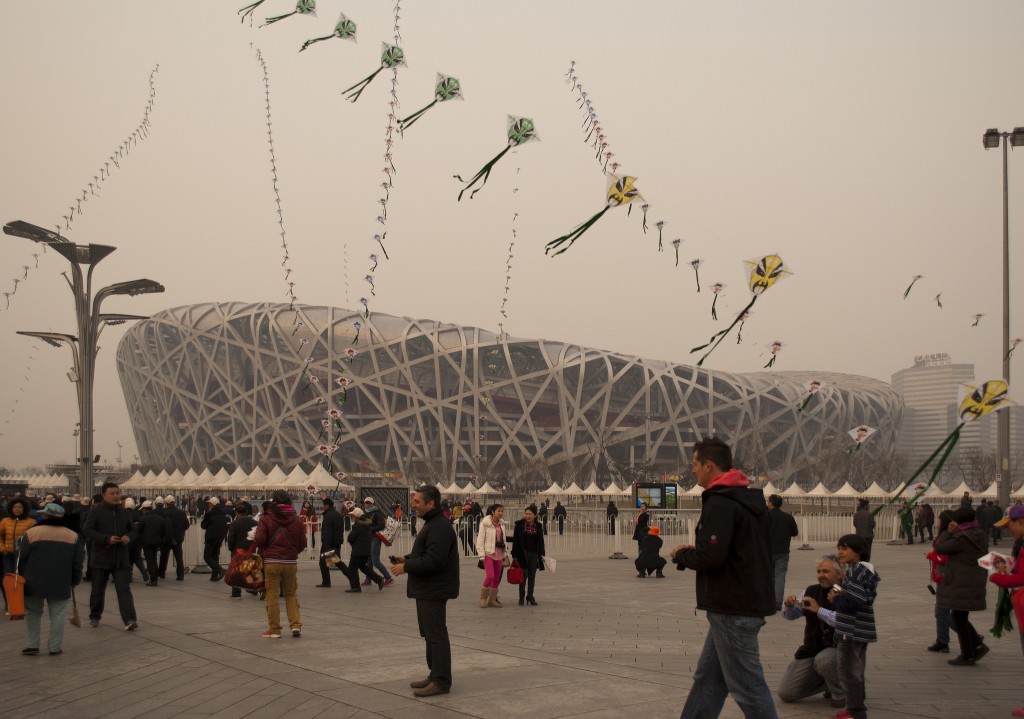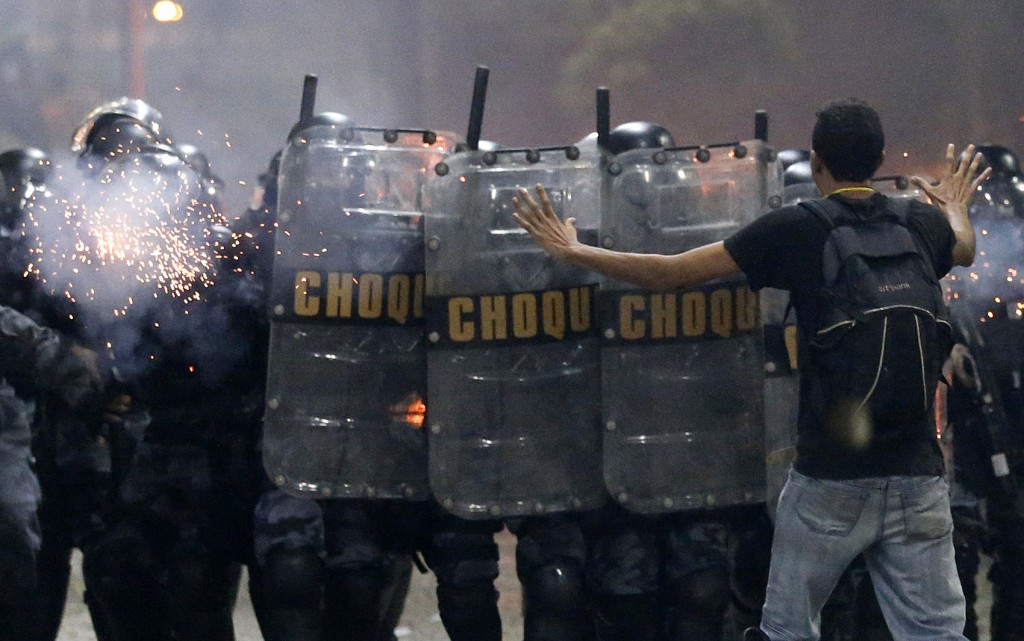The Turkish government is investing massively to bring the 2020 Games to Istanbul. Recent experience, however, suggests that far from bringing home the gold, hosting the Olympics often spells disaster.
Kadir Topbas, the mayor of Istanbul, has been very busy lately. This May, his city erupted in protest. Upset at Prime Minister Recep Tayyip Erdogan’s decision to build a mall in Gezi Park, Istanbul’s last remaining green space, protesters began a sit-in that metastasized into a mass movement against the ruling government. Despite increasing violence from the police, the protests continued for weeks, and could start again at any time.
But Mayor Topbas has even bigger things on his mind: Istanbul is currently competing against Madrid and Tokyo for the right to host the 2020 Summer Olympics. The decision will be voted upon by the International Olympic Committee (IOC) in September, and Turkish government officials fear that if the protests continue, the IOC will give the Olympics to a more stable city. “If these [incidents] continue, and there are problems,” Topbas said on June 24, “the 2020 Games will be but a dream.”
Prime Minister Erdogan, however, should be no less worried about what happens if Istanbul gets the Olympic nod. Spending the next seven years preparing for the Games would only exacerbate the underlying causes of the Turkish protests. In a city that is already a powder keg of discontent, an explosion would probably be inevitable.
Indeed, hosting the Olympic Games in the modern era has, with only a few exceptions, been economically and politically ruinous for the countries involved. For a prime minister whose position is increasingly precarious, this would be an unprecedented disaster. Ironically, if Turkey wins the right to host the games, it could mean Erdogan’s undoing.
The Turkish government has been pushing to host the Summer Olympics since 1993, thus far without success. Indeed, it has never gotten closer than fourth place. Erdogan was in power when the 2012 Games were voted on in 2005, and Istanbul’s bid did not even make the final ballot. Chastened, Erdogan made sure that the city’s 2020 proposal was of the highest caliber. He did so, in part, by demonstrating that Istanbul can host large-scale sporting events. Over the past few years, world championships in basketball, swimming, and track and field have all taken place in the city. This is one of the reasons Istanbul is now the ninth-most visited city in the world.

Ataturk Olympic Stadium hosted the finals of the 2007 Champions League Tournament. Photo: Stephen Chipp / flickr
But the most important aspect of Turkey’s bid is also the most potentially explosive: money. Istanbul’s proposal to the IOC predicts that hosting the Olympics will cost the country around $3 billion, including $840 million in stadium construction and renovation costs and $550 million in government subsidies. Another $12 billion is slated for infrastructure improvements, including building a new airport and updating Istanbul’s subway and bus systems. In addition, the government has pledged to cover any budget shortfalls (which are almost certain to occur), and created a $200 million “rainy day” fund.
Hosting the Olympics, and changing Istanbul’s infrastructure in order to do so, is politically important to Erdogan. It is part and parcel of his “2023 Vision”—an official government plan for achieving global superpower status by the 100th anniversary of the Turkish republic. The plan is, needless to say, massively ambitious. It calls for Turkey to have one of the top ten economies in the world by 2023, with a GDP of $2 trillion (it is currently 17th with $794 billion) and a GDP per capita of $25,000 (currently $11,000). In addition, Turkey is to be the world’s fifth-largest tourist destination, with 50 million visitors per year (it is currently in sixth place with 31 million per year). It is to build 15,000 kilometers of new highways and 11,000 kilometers of new railways, reduce unemployment to 5 percent, and achieve membership in the European Union.
Erdogan’s vision has already led to massive construction projects and infrastructure development across Turkey, and especially in Istanbul. Such drastic changes have their downside. The displacement and dissatisfaction they have caused are a major factor in the rise of anti-Erdogan sentiment among urban professionals and, of course, the continuing protests in Istanbul and elsewhere. The prime minister likely believes that hosting the Summer Olympics will both advance and justify his vision. In addition, he probably hopes the games will turn the eyes of the world to Turkey and unite the nation in a wave of patriotism, ensuring his continued popularity. The Olympics, Erdogan may believe, can secure both his vision and his government.
In all likelihood, however, Erdogan is very wrong. It is widely accepted that the world’s biggest sporting event bestows profits, prestige, and political benefits on its host. But this severely misreads the history of the games, which shows that they have often had profoundly negative ramifications for their host countries and, of course, those countries’ rulers.
Hosting the Olympics is a gargantuan undertaking that costs billions of dollars and leads to a dramatic transformation in the host city’s landscape, not always for the better. Put simply, the political, economic, and social costs involved often far outstrip everyone’s expectations.
First, the budget required usually doubles or triples over the course of official preparations, leaving the host government to pick up the tab. Sydney overshot its budget by a factor of three, leaving the public on the hook for more than $1 billion. After deciding to pay for hosting the 2004 Olympics solely with public funds, Greece was left $15 billion in debt due to rushed, last-minute construction projects and the ensuing overtime pay. Nagano, Japan, which hosted the 1998 Winter Olympics, currently spends $10 in upkeep for every dollar it receives from its Olympic facilities. It took Montreal thirty years to pay off its debt from hosting the 1976 Summer Games.
Most cities ultimately claim to break even from ticket sales and sponsorship revenue. Their official budget figures, however, only include costs directly related to hosting the events themselves, such as building stadiums and the Olympic Village, as well as implementing security measures and scalper-proof ticketing procedures. They do not take into account the cost of infrastructure improvements promised to the IOC as part of a city’s official bid. These costs can amount to ten times the official budget. They often include building new airports and hotels, as well as building or renovating public transportation systems.
These improvements frequently prove to be a white elephant. After the games are over, there is often little use for the arenas, stadiums, and other facilities a city must construct. 21 out of the 22 structures built for the Athens Olympics are currently unoccupied, and it costs the already-insolvent Greek government $780 million a year to maintain them. The Bird’s Nest, the iconic stadium of the Beijing Olympics, lies dormant; while the Water Cube, a state–of-the-art swimming facility, is now a children’s water park.
In addition, while massive infrastructure projects are often beneficial in the long term, they regularly inconvenience and anger local residents, whose lives are disrupted by their construction. This is especially the case when these structures have limited post-Olympics viability. Sometimes, the result is serious domestic unrest. Particularly in countries that lack viable democratic institutions. Without a political outlet for their frustrations, the people often resort to anti-government protests, airing a wide variety of grievances.
Perhaps the most famous—and bloody—example of this took place in 1968, when Mexico City hosted the Olympics. Mexico’s ruling PRI party spent billions in preparation for the games while cracking down on domestic dissent. Although the PRI was democratically elected, Mexico was effectively a one-party state, so anger at the government could not be alleviated by voting it out of power. As a result, disaffected students took to the streets in the months leading up to the games, when they knew the world’s attention would focus on Mexico. Their slogan was “¡No queremos olimpiadas, queremos revolución!”—“We don’t want Olympics, we want revolution!” Less than a month before the games, the unrest culminated in the Tlatelolco massacre, in which dozens—possibly hundreds—of protesters were shot by government snipers and more than one thousand arrested.
In 1988, South Korea successfully brought down its government as a result of Olympics-related discontent. As in Mexico, rapid industrialization had turned South Korea into an economic powerhouse, leading its government to believe that hosting the Olympics would be a symbol of its ascendance onto the world stage. Chun Doo-Hwan, South Korea’s dictator at the time, hoped the games would legitimize his autocratic rule and arouse a patriotic fervor that would stifle opposition. In fact, the opposite occurred. In the year preceding the Olympics, pro-democracy demonstrations began to erupt.
The IOC has always portrayed itself as above politics, but remembering the shadow that the Tlatelolco massacre had cast over the 1968 Games, and after two Olympics in a row had been boycotted by major powers in the 1980s, the organization was desperate to avoid controversy. In addition, New York, Los Angeles, and Berlin, among others, expressed interest in replacing Seoul should the unrest continue. This put the South Korean leadership in a serious bind: The games were supposed to showcase South Korea’s international standing, but if the government failed to accede to the protesters’ demands, its international image would suffer a serious blow. Eventually, Chun announced that he would step down, and pledged that the constitution would be rewritten and elections held.
Something similar may be taking shape today in Brazil. The mass protests occurring there, especially in Rio de Janeiro, have been partially motivated by the country’s plans to host the 2016 Olympics. Preparations for the games have, as usual, gone wildly over budget, leaving taxpayers stuck with the bill. Brazilians, in turn, are angered that the money has been spent so recklessly on the Olympics while neglecting social programs and other domestic concerns. Many residents of Rio, especially those from the favelas, have been left homeless by the urban reorganization demanded by the games. As in Mexico and South Korea, the Brazilian protesters are young and largely unaffiliated with any political party. The Olympics have once again served as the spark that ignited a more general sense of discontent.
Given all of these drawbacks, it is worth asking what benefits, if any, are offered by hosting the Olympics. There are really only two: Positive, if short-lived, feelings of patriotism and communal self-regard; and long-term improvements in transportation infrastructure. While improvements in transportation may be necessary and beneficial, most other Olympics-related spending is quite wasteful. After all, if a city’s economy demanded the construction of a field hockey pitch or equestrian track, one would have been built already. This is why the Olympics with the most successful legacies—such as those hosted by Barcelona, Atlanta, and London—were largely dependent on the use of pre-existing structures (or at least, in the case of Atlanta, the guarantee of future use).
This will not be the case in Istanbul. Indeed, the city has already promised to construct 21 new and permanent venues should it host the 2020 Games. This is sure to anger the Gezi Park protesters, whose primary grievance is Istanbul’s rapid and undesired urban development.
Moreover, economic analyses indicate that Erdogan’s belief in the games as the fulcrum of his 2023 Vision is woefully short-sighted. In fact, his massive spending on Olympic preparations will not make Turkey into an economic powerhouse, but precisely the opposite. According to a study by economists Robert Baade and Victor Matheson, “diverting scarce capital and other resources from more productive uses to the Olympics very likely translates into slower rates of economic growth than that which could be realized in the absence of hosting the Olympic Games.” In other words, the government’s efforts to expand Istanbul’s airports and subway system may be beneficial, but spending public funds on unnecessary sports facilities diverts that money from other, more necessary projects and programs.
It is also entirely unclear whether hosting the Olympics will boost tourism. The European Tour Operators Association, which would surely promote any correlation between hosting the Olympics and an increase in tourism, has stated that “there appears to be little evidence of any benefit to tourism of hosting an Olympic Games, and considerable evidence of damage.” In fact, the organization claims, hosting the Olympics actually scares off tourists. Hotel occupancy goes down in the months before the games, as tourists fear jacked-up prices and a glut of other tourists. As Yogi Berra once put it, “Nobody goes there anymore, it’s too crowded.”
During the games, moreover, most hotels are taken up by the thousands of journalists and other media that converge on the city, who are usually too busy to spend money at traditional tourist attractions. The few foreign tourists that do come only attend the sports events, from which most of the revenue goes toward paying off the debt accrued by hosting the Olympics in the first place.
By and large, the cities best suited to host the Olympics are those that already contain most of the venues needed for such a wide variety of sporting events, and are located in a country with strong democratic traditions. A city without democratic institutions can also serve as a successful Olympic host so long as it can effectively stifle internal dissent—for example, Moscow and Beijing.

Turkish tear gas in Gezi Park, May 2013. Will Olympic-sized spending make things worse? Photo: homeros / 123rf
Turkey, however, belongs to a third and less successful group of Olympic hosts, which could be called “aspirational superpowers.” These are usually countries with weak democratic traditions that hope to use the Olympics to signal to domestic and international audiences that they are rising in importance. Due to poor economic and urban planning, as well as a lack of outlets for general discontent, they tend to expose themselves to a wave of anger that can endanger their governments’ hold on power. The Erdogan government, in short, stands to gain little and lose a great deal as a result of hosting the games.
Turkey’s chances of hosting the Olympics, it should be noted, do not seem particularly good at the moment. Anonymous sources—almost surely advocates of the Tokyo bid—have told the media that the recent unrest in Istanbul, as well as the civil war in neighboring Syria, make Turkey a dangerous place to host the Olympics. Nonetheless, the opportunity to brand the 2020 Games as the first to take place in a Muslim country may be too good to pass up. Indeed, Istanbul 2020’s slogan, “Bridge Together,” is a reference to both Istanbul’s location on two continents and the Olympic dream of using sports to rise above politics, forging common bonds between geopolitical enemies. It is possible that sentiment will prevail over more prosaic considerations.
If Erdogan is victorious when the IOC votes in September, he will claim it as a victory for Turkey and the Turkish people—and possibly as an international vindication of his rule. But his smile may fade over the next seven years, as the money pit that is hosting the Olympics leaves him exposed to increased dissatisfaction from his own people. Erdogan’s position is already precarious, as his impossibly ambitious plans for Turkey spark mass demonstrations in the very city he hopes will host the games. If the history of the Olympics holds true, what Erdogan hopes will be his greatest victory could prove his most catastrophic defeat.
![]()
Banner Photo: Singapore 2010 Youth Olympic Games / flickr







